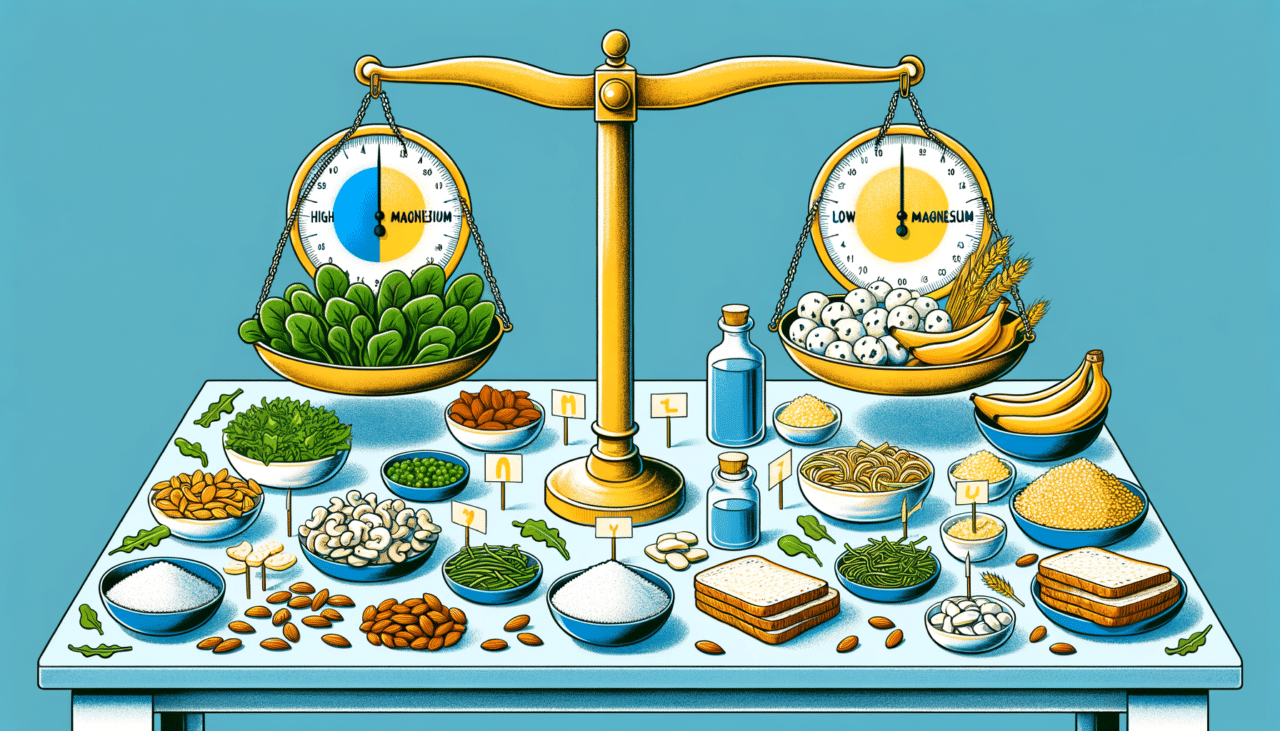In the bustling world of nutrition, where dietary trends come and go like seasonal fashion, magnesium remains a steadfast player, crucial for maintaining optimal health. Often overshadowed by its flashier counterparts like calcium and vitamin C, magnesium quietly powers over 300 enzyme systems in our body, influencing everything from muscle function to energy production. Today, we delve into the intriguing world of dietary magnesium, comparing the high-magnesium diet with its low-magnesium counterpart. Let’s explore their characteristics through an engaging narrative and a comparative table to help you make an informed decision about your dietary choices.
Understanding Magnesium: The Unsung Hero
Imagine magnesium as the silent conductor of a grand symphony. While the spotlight often shines on the soloists like proteins and fats, magnesium coordinates the harmonious performance of various bodily functions. Its presence is vital for nerve function, blood sugar regulation, and even the synthesis of DNA. Yet, despite its importance, magnesium often doesn’t get the attention it deserves.
High-Magnesium Diet: Characteristics and Benefits
A high-magnesium diet is akin to a well-oiled machine, ensuring your body functions at its best. This diet is rich in foods such as leafy greens, nuts, seeds, and whole grains. Here’s how these foods contribute to your health:
-
Enhanced Energy Production: Magnesium plays a pivotal role in converting food into energy, making it essential for those leading an active lifestyle.
-
Improved Muscle Function: Athletes and fitness enthusiasts benefit from magnesium’s ability to maintain muscle function and reduce cramps and fatigue.
-
Heart Health Support: By regulating blood pressure and supporting vascular health, magnesium is a key ally in maintaining a healthy heart.
-
Bone Strength: Partnering with calcium, magnesium contributes to bone density and reduces the risk of osteoporosis.
-
Mood Regulation: Magnesium has been linked to improved mood and reduced symptoms of depression and anxiety.
Low-Magnesium Diet: Characteristics and Considerations
On the flip side, a low-magnesium diet is like driving a car with the handbrake on. It may still move, but not as smoothly or efficiently. Here are some characteristics of a magnesium-deficient diet:
-
Increased Fatigue: Without sufficient magnesium, energy production falters, leading to chronic fatigue and weakness.
-
Muscle Cramps and Spasms: Magnesium deficiency is notorious for causing uncomfortable muscle cramps and spasms.
-
Cardiovascular Risks: Low magnesium levels are linked to higher blood pressure and increased risk of heart disease.
-
Bone Health Concerns: A lack of magnesium can accelerate bone loss, increasing the risk of fractures.
-
Mood Instability: Insufficient magnesium can lead to mood swings, irritability, and higher levels of stress and anxiety.
Comparative Table: High-Magnesium Diet vs. Low-Magnesium Diet
| Aspect | High-Magnesium Diet | Low-Magnesium Diet |
|---|---|---|
| Energy Levels | High energy levels; efficient metabolism | Chronic fatigue; sluggish metabolism |
| Muscle Function | Optimal muscle performance; fewer cramps | Increased cramps; muscle weakness |
| Cardiovascular Health | Supports heart health; regulates BP | Higher risk of hypertension and heart issues |
| Bone Health | Stronger bones; reduced osteoporosis risk | Weaker bones; increased fracture risk |
| Mood and Mental Health | Improved mood; reduced anxiety | Mood swings; higher anxiety and stress |
Choosing the Right Path for You
In the grand tapestry of nutrition, choosing between a high-magnesium and a low-magnesium diet is akin to selecting the right thread for your health journey. If you are an active individual or someone with a family history of heart disease or osteoporosis, embracing a high-magnesium diet could be your best bet. On the other hand, if you struggle with chronic fatigue or mood instability, it might be worth evaluating your magnesium intake.
Conclusion: Weaving Magnesium into Your Life
Incorporating magnesium-rich foods into your diet doesn’t require a drastic overhaul. Start with a handful of almonds or a serving of spinach and watch as this humble mineral starts to weave its magic into your life. Remember, like a skilled conductor, magnesium orchestrates a symphony of health benefits, ensuring your body and mind perform at their peak. For a healthier, more vibrant you, let magnesium take center stage in your dietary choices.
Make informed dietary decisions and discover more about the benefits of magnesium on CompareAnything.org, where knowledge meets nourishment.

Comments (0)
There are no comments here yet, you can be the first!